Jody Coale has been passionate about recycling since she was 15 years old. In her garage at her Southeast Portland home, she has shelves and bins dedicated to specific items for recycling.
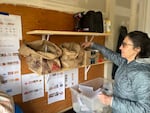
Jody Coale, who began using Ridwell in 2021, sorts some of her recycling in her garage on Monday, April 15, 2024. Coale has been recycling for more than 50 years, developing her own system to keep things organized.
Monica Samayoa / OPB
“This is for long-term electronic recycling, this is [for] my bottles, like medicine bottles, lids and bread wrappers and clear plastic,” she said as she pointed to different brown bags stacked on shelves.
When she was younger, Coale recycled newspapers and glass and would ask to be driven around town to find the proper place to recycle them.
Now at 70 years old, Coale has signed up for a door-step recycling service with Ridwell. Ridwell is a Pacific Northwest-based recycling company that collects hard-to-recycle items that traditional city trash and recycling haulers don’t process, and gives them a second life. Some of the items include grocery and chip bags, bubble wrap, light bulbs, pill bottles and even bottle caps.
“I collect mostly everything,” Coale said. “I’m very sure to clean it and dry it before I put it into my Ridwell categories.”
She said discovering a recycling company like Ridwell was a dream come true.
“There’s been so many times I am not happy to be throwing stuff in the trash or I’ll collect things and drive it all over town to have stuff be reused or recycled and now someone’s coming to my door,” she said. “Yes!”
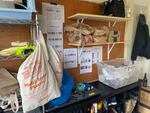
Coale has been recycling for more than 50 years, creating her own system to organize items to recycle through Ridwell.
Monica Samayoa / OPB
Coale said she recycles about 50% of those untraditional items through Ridwell. She loves recycling so much, she even collects items while traveling. She recently brought back coffee bags.
“I just got back from New York, and I have a whole bunch of junk,” she said. “This is Brooklyn brand coffee.”
Coffee bags are the latest thing that Ridwell members and coffee drinkers like her can recycle. That’s because Ridwell, along with a Portland coffee roaster, have started to collect the once hard-to-recycle bags and repurpose them to celebrate Earth Day.
Filling the gaps in municipal recycling
For more than 50 years, Earth Day has been celebrated by environmental advocates to raise awareness and support sustainability and environmental protection. This year, the theme is Planet versus Plastics, and organizers are calling for a 60% reduction in the production of plastics by 2040. That could help lead to a plastic-free future.
As more items like single-use plastics or multi-layered plastics are mass produced, most of them do not get recycled due to the difficulty of breaking them down into raw materials once again.
Related: We never got good at recycling plastic. Oregon and other states are trying a new approach
According to the Environmental Protection Agency, nearly 36 million tons of plastic was generated across the nation in 2018. Only 3 million tons were recycled, while most of it went to landfills.
In Oregon, more than 270,000 tons of plastic were disposed of in 2016 and about 16% of that plastic was recycled. The state is currently restructuring its recycling process to make it easier for residents to understand what goes in the recycling bin and what doesn’t. Regulators are also working on ways to reduce contamination and simplify collection so that more recycled items get a second life.
That’s where Ridwell comes in.
“We are able to recycle 97% of the items that we receive from our Ridwell members,” Ridwell’s Regional Director Taylor Loewen said.
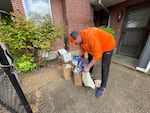
Ridwell's Jason Glass drives around Southeast Portland collecting items from customers on April 15, 2024. He uses a company app that maps his daily route to each customer. On average he makes 100 stops.
Monica Samayoa / OPB
She says the company works on filling the gaps that traditional recycling cannot process.
So far, Ridwell has about 25,000 members in the Portland metro area and, as a company, has diverted more than 20 million pounds of waste from landfills across seven states since 2018.
The 3% that doesn’t get recycled is usually due to mixed materials, Loewen said, like Amazon mailers that are paper on the outside but plastic on the inside
Items like that create many challenges that halt the recycling process, she said.
“Many items are technically recyclable, but it’s whether or not they make sense to have a co-mingled curbside recycling process,” she said.
When items get thrown into the bin for recycling, it all ends up going to the same place for processing. Loewen says some items like plastic bags get caught in machinery at traditional recycling facilities, which stops production and makes it challenging to do at a large scale.
Other roadblocks include finding a market that will take the items after being sorted and recycle them into something new.
Related: Ridwell sues Washington County for banning its recycling service
Apart from making it easier for its members to collect items that are hard to recycle in one place, Ridwell finds and works with partners that will give the items a second life through local nonprofits and organizations.
“The stretchy plastic film goes to a company called Trex and is made into a composite lumber,” she said. “A lot of people in the Pacific Northwest have Trex decking in their backyards. The plastic clamshells get ground into clamshell flakes and then are turned into new containers. It’s the next Organic Girl or Driscoll’s Berry container.”
And up until recently, coffee bags were difficult for Ridwell to recycle.
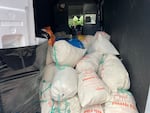
Ridwell collects items that are not traditionally recycled through city curbside haulers. Some of those items include plastic film like grocery bags, multilayer plastics like chip and coffee bags and clothing shown in this truck on April 15, 2024.
Monica Samayoa / OPB
“Coffee bags are multi-layer plastic, which is really challenging to recycle because it’s different types of materials melted together and you can’t easily piece those materials back out apart,” she said.
Now, Ridwell has partnered with HydroBlox, which turns coffee bags into landscaping drainage materials. But it’s not the only partnership that is helping increase recycling production.
Partnerships underly a new recycling effort
Nossa Familia is a Portland-based coffee roaster with a special certification — B Corp. That means the company seeks to meet the highest stands in transparency, accountability, social and environmental performance.
Marketing manager Jocelyn SyCip calls it the triple bottom line — People, Planet and Profit.
“So always considering sustainability and community in everything that we do,” she said.
Related: How the Pacific Northwest is shaping coffee culture
The company has been working on ways to recycle its coffee bags. This included reaching out to different recycling companies, including Ridwell, to find a solution.
Nossa Familia hit roadblocks early on due to contamination.
“They all came back saying the oil from the coffee beans, it’s just too much of a problem,” she said.
In 2016, Nossa Familia made its bags out of compostable materials, but it didn’t work out.
“If it did go into the home compost and ended up in a Portland green bin, it was creating more problems for them because it wasn’t breaking down and it was more difficult for them to separate and could lead to further issues along the way in terms of being able to turn that into usable compost,” she said.
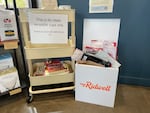
Used Nossa Familia coffee bags fill a Ridwell recycling container on April 15, 2024. Ridwell partnered with the Portland coffee roaster to collect multi-layered coffee bags from customers for the month of April to celebrate Earth Month.
Monica Samayoa / OPB
Once Nossa Familia designed a new bag that made it easier to recycle and started to move away from compostable bags, SyCip said Ridwell reached out.
“It was the sort of perfect coming together synergy of initiatives,” she said.
As soon as customers were aware of the recycling program, Nossa Familia’s Ridwell bin started to fill up. So much so that, according to staff, a family brought in three years’ worth of coffee bags to recycle.
“This starts to feel like this is doable and there are real solutions here,” she said.
SyCip says Nossa Familia will be accepting coffee bags until the end of April, while Ridwell will continue to collect them from its customers — like Jody Coale.
“I don’t have a trash can emptied except once a month and it’s like a half to three quarters full because I do all this,” she said. “I love doing it.”
Correction: Jody Coale’s last name was misspelled in an earlier version of this story. OPB regrets the error.
